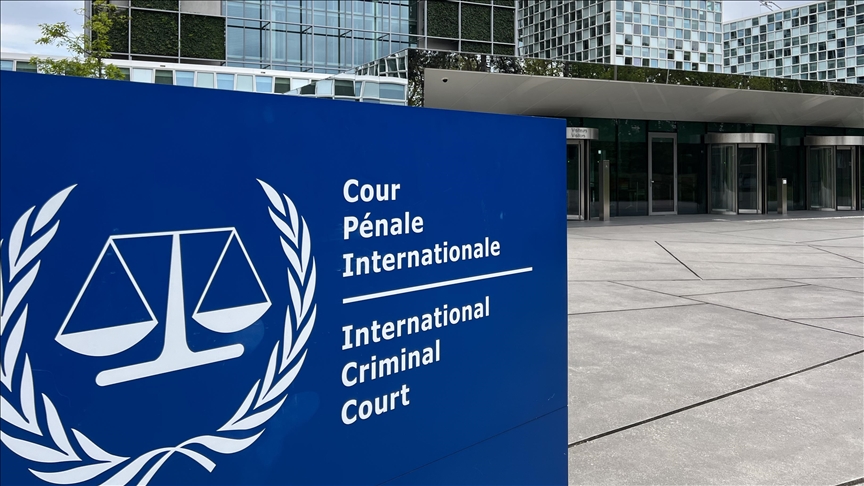‘Blocking statute’: EU faces test over shielding ICC from US sanctions
Legal scholars say EU inaction undermines rule of law and international justice

- EU’s blocking statute could prohibit European firms from complying with US sanctions targeting ICC
- EU previously used the measure against sanctions on Cuba and Iran
ISTANBUL
The EU is facing a pivotal decision that scholars say could test its commitment to international justice: Will it invoke its “blocking statute” to shield International Criminal Court (ICC) officials from sweeping US sanctions?
Last month, the US sanctioned four ICC officials, including judge Nicolas Yann Guillou, who authorized the arrest warrants for Israeli Prime Minister Benjamin Netanyahu and former Defense Minister Yoav Gallant over alleged war crimes in Gaza.
Also targeted were Deputy Prosecutors Nazhat Shameem Khan and Mame Mandiaye Niang, accused of “supporting illegitimate ICC actions against Israel” by upholding the warrants against Israeli leaders.
The EU has the option of pushing back by invoking its blocking statute – legislation that prohibits EU companies from complying with US sanctions imposed beyond American jurisdiction.
But so far, Brussels has chosen not to act.
“It is shocking that the EU has not yet included these unlawful US sanctions in its blocking statute,” Luigi Daniele, associate professor of international law at the University of Molise in Italy, told Anadolu.
Facing what he described as genocide and sanctions designed to intimidate and undermine senior international justice officials, Daniele said the EU’s hesitation is indefensible.
“It is clear that the greatest economic powers of the EU are willfully protecting the effects of these unlawful sanctions,” he said. “As such, they should respond both to their populations and to international legal institutions for this willful inaction.”
Daniele called the EU’s stance “unacceptable, not only from the legal point of view, but also from the political and moral point of view.”
In February, the Trump administration also sanctioned the ICC and Karim Khan, its chief prosecutor, accusing the court of “baseless actions targeting America and our close ally Israel.”
What is the blocking statute?
The blocking statute is the EU’s key tool to protect European operators from the extraterritorial reach of US sanctions, legal scholar Sergey Vasiliev explained.
“In a way, US sanctions become ‘blocked’ in the EU territory, as individuals and companies are prohibited from complying with them by refusing to provide products and services to sanctioned individuals and organizations,” Vasiliev, professor of international law at the Open University in the Netherlands, told Anadolu.
He pointed to businesses that provide IT, banking, insurance or consultancy services to the ICC or its officials as examples of entities directly exposed to US pressure.
Sanctions designations, he noted, produce a chilling effect – designated persons become “toxic” for potential partners who fear US punishment.
“The blocking statute provides legal cover to EU operators, assuring them they should not fear such extraterritorial measures within the EU,” Vasiliev said.
The regulation, directly applicable across all member states, is meant to uphold EU sovereignty and shield citizens and businesses from foreign laws that undermine the bloc’s interests.
The EU has invoked the blocking statute in the past.
“The EU has done so in the past for much less tragic and severe situations in which the sanctions had levels of illegality and criminality which are incomparable to what is being done with these sanctions today,” said Daniele. “It happened for Cuba. It happened when, under (former US President Barack) Obama, Iran negotiated the nuclear deal with the US.”
Vasiliev agreed, noting that “there is no reason not to do the same now for the ICC.”
Why has the EU not acted yet?
For Vasiliev, Brussels’ silence undermines its repeated declarations of support for the ICC’s independence.
“The gravity of the situation clearly warrants action: six judges – a third of the entire bench – and the three most senior officials in the Office of the Prosecutor have already been sanctioned,” he said.
At a minimum, Vasiliev argued, the EU could amend the annex to the Council Regulation to extend protections to ICC officials.
“This amendment would not be the definitive solution, as companies might still err on the side of caution and find ways to comply with US sanctions,” he said. “But at least it would have been more meaningful than the endless stream of hollow statements of regret.”
Some EU states are pressing for action. Belgium and Slovenia have called for invoking the blocking statute, while Germany has sharply criticized Washington’s measures. Spain and Ireland also appear supportive.
EU foreign policy chief Kaja Kallas expressed “deep regret” over the sanctions in August, warning they could obstruct the court’s work. She pledged continued support to shield ICC personnel from external pressure, but so far, no binding action has followed.
“This shameful inaction by the EU is legitimizing unprecedented dismantling of the minimum legal standards which keep us all together, which keep us all protected in present and future wars,” said Daniele.
“Continuing not to act on the blocking statute means that international justice is reduced to a tool of hybrid warfare against US rival powers.”
Anadolu Agency website contains only a portion of the news stories offered to subscribers in the AA News Broadcasting System (HAS), and in summarized form. Please contact us for subscription options.







